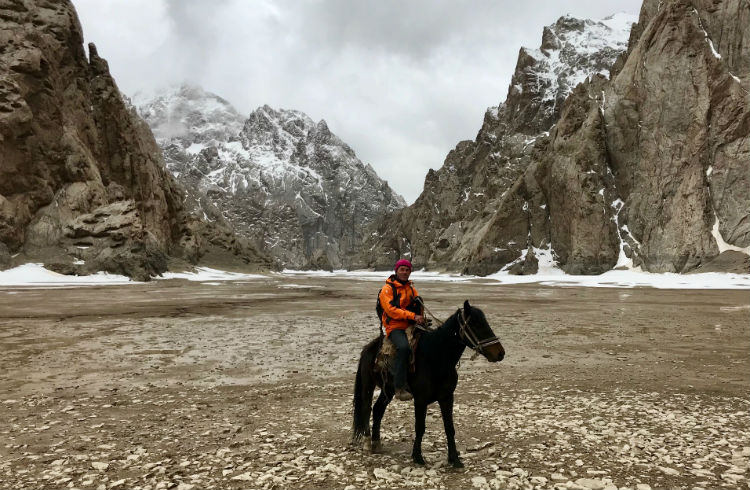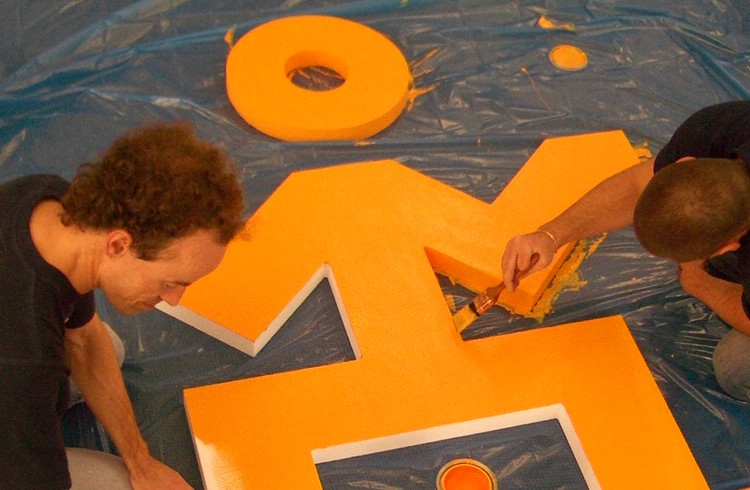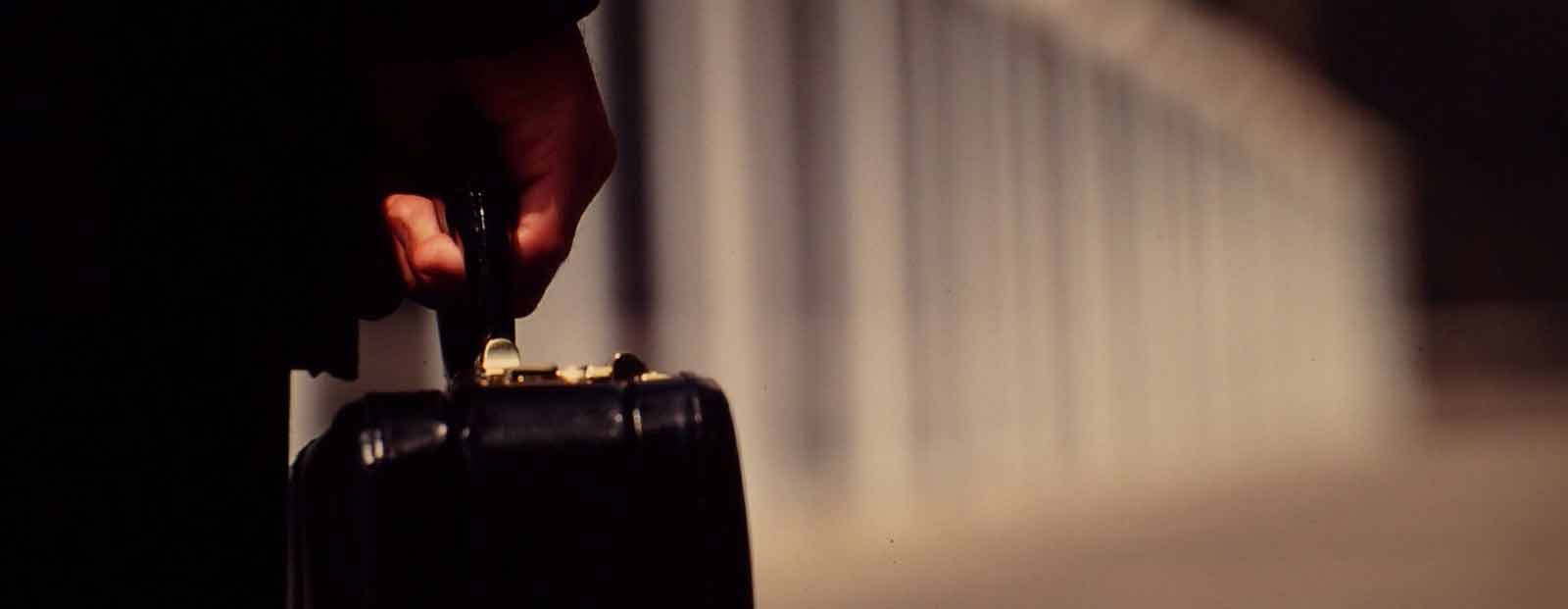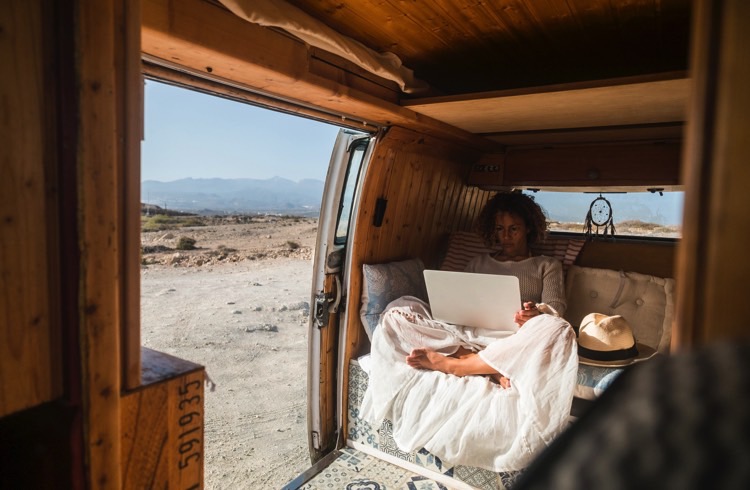Simon Monk is the man who founded World Nomads. A modern-day Marco Polo, who bought a URL that reflected the way he liked to travel - the rest is history.
 Photo © Simon Monk
Photo © Simon Monk
Listen Now
Amazing Nomads Podcast: Simon Monk
In this episode, find out where the name World Nomads came from when we chat to the man who started it all, Simon Monk. In 1996, he bought a URL that represented the way he wanted to travel, and the rest is history.What's in the Episode
00:17 The birth of World Nomads01:25 Life before blogging
02:05 What's Simon been up to in 2018
04:42 Never put your hand in your pocket
07:25 Traveling with children
09:30 No 19 year old should be able to afford business class!
13:00 Inspo from Steve Jobs
14:25 Everything else but insurance
16:48 Traveling through Central Asia
17:47 Have you ever made a claim?
18:48 It's never the bus crash
21:09 Get in touch
Who is in the Episode
Simon Monk is the founder of World Nomads. In 1989, Simon quit his job, sold everything he had and headed off to explore the world. A modern-day Marco Polo.
“The sensation of being able to go anywhere, do anything and be answerable to no-one but myself was my first taste of the pure freedom you rarely feel anywhere other than on the road.”
Simon took out a travel insurance policy to cover him for a couple of months; he thought it would take him to head to Australia. “But, as with all the best travel plans, they changed: I ended up in China during the tumultuous summer of 1989; with no insurance, and no means of getting any.
“Over the next few years of traveling, I met many fascinating travelers, all sharing a spirit of adventure and that heady sense of freedom. It was a community of like minds that shifted loosely across the globe. But – this being pre-internet days – staying in touch was letter and post restante!
“Then, in 1997, I bought worldnomads.com as my personal website address - thinking it sort of philosophically reflected who I was.”

Resources & Links
Scholarships Newsletter: Sign up for scholarships news and see what opportunities are live here.
Find out more about our Footprints projects here.
Want to Republish This Episode
<iframe width="100%" height="200" src="https://player.whooshkaa.com/player/episode/id/314011?visual=true&sharing=true" frameborder="0" style="width: 100%; height: 200px"></iframe>
Next Episode: Women in Travel
About World Nomads & the Podcast
Explore your boundaries and discover your next adventure with The World Nomads Podcast. Hosted by Podcast Producer Kim Napier and World Nomads Phil Sylvester, each episode will take you around the world with insights into destinations from travelers and experts. They’ll share the latest in travel news, answer your travel questions and fill you in on what World Nomads is up to, including the latest scholarships and guides.
World Nomads is a fast-growing online travel company that provides inspiration, advice, safety tips and specialized travel insurance for independent, volunteer and student travelers traveling and studying most anywhere in the world. Our online global travel insurance covers travelers from more than 135 countries and allows you to buy and claim online, 24/7, even while already traveling.
The World Nomads Podcast is not your usual travel Podcast. It’s everything for the adventurous, independent traveler.Announcer: The World Nomads Podcast bonus episode. Hear amazing nomads sharing their knowledge, stories, and experience of world travel.
Phil: Kim, the name of the brand we work for, World Nomads, it's awesome. It says what it is on the, what's inside the can, all right.
Kim: Yeah.
Phil: But, people often ask me where the name came from. It came from one of the co-founders, and I'm very happy to say that he joins us live in the studio right now. Simon Monk, welcome to the podcast.
Simon Monk: Well, thank you,
Phil: Go on tell us the story, where does World Nomads come from? Where does the name?
Simon Monk: Back in the early days of the internet, this is been working in the space for a few years, and I wanted to buy a URL that represented the way I saw travel, and I saw myself very much as a world nomad. I looked up the domain, and it was available, so I bought it.
It was dead easy in 1996, didn't have to worry. I think I ended up buying the one in the UK and the dot-com, the top-level domain, and a couple of others, and then I set up I think a blog that was like a travel blog of here's some photographs and some stories from my trips and things, didn't really think of it as a business, and that all came a bit later.
Kim: How did your blog then compare to the blogs, the travel blogs that you see now?
Simon Monk: Oh, back in the early days it was like, there was no blogging software. Blogs didn't exist actually. This was like travel ... I used to send stories in by fax I seem to remember to post there.
Kim: Really?
Simon Monk: Yeah, literally by fax. The rolls of film, back in the days of pre-digital photography, you sent the rolls of film by courier, and I think it was published on Telstra BigPond with a producer called Anna. Yeah, it was all done by fax, very-
Phil: That would be-
Simon Monk:... very old school.
Phil: That would, was even Myspace around then, or is it, are you pre-dating Myspace?
Simon Monk: I think it's pre-dating Myspace. This was just a series of travel stories of a journey through Central America.
Kim: The original world nomad.
Phil: Well, that's, you had to find an [inaudible 00:01:55], and that's it, right? Original Nomad. One of the things I like best, Kim, whenever I see Simon is asking this question, so here we go, where have you just been, mate?
Simon Monk: Well, this year's been a pretty busy travel year actually. I've just got back from studying Japanese in Japan in a little town called Kanazawa. Before that, 10 days before that, I got back from a trip to Turkey.
Before that, I was traveling through Central Asia, Kazakhstan, Kyrgyzstan, where else? Uzbekistan, so the whole region of Central Asia is quite fascinating for me. It's taken me 30 odd years but, more or less, retracing the steps of Marco Polo in pieces.
The weird this is that when you're a kid, you look at Marco Polo, and you think, "Wow," that's a 13th-century journey right across to the other side of the, 20 years to China and back. Actually, having done it now, in pieces, you can quite see how he did it. It's not that hard.
Kim: It's not that hard.
Phil: Marco Polo's overrated.
Kim: You don't do this for work. This is purely for pleasure.
Simon Monk: Pleasure's the wrong word. Some of my treks and things in the Himalayas, it's the memories are great after you're finished and, yeah, warmed up again.
Kim: Yeah, right.
Simon Monk: Dried out.
Phil: Can I just jump back to the 'Stans, all right, because they're really popular at the moment. They're like the hot, new destination.
Kim: We've got an ep' coming up.
Simon Monk: Oh, really?
Phil: We have an episode-
Kim: Yeah.
Simon Monk: Fascinating.
Phil:... coming up-
Simon Monk: Yeah.
Phil:... as well. What was your experience like there?
Simon Monk: I'm not quite sure what I expected, to be honest. I've been to Turkey and Iran, and, somehow, I supposed it was going to be a more desert-like version of that, perhaps, and it was nothing like that at all.
Phil: Really?
Simon Monk: Surprisingly, yeah. Traveled, I think started in Uzbekistan and, then, went through to Kyrgyzstan. The whole region is quite green, even ... Again, if you ignore country borders for a moment, they're modern definitions of a country, and you think of it in regions, the region just across the Chinese border, on the 'Stans side of the Chinese border, is quite lush and green, and they grow strawberries and grapes.
Kim: Wow.
Simon Monk: I was in a little area around the Fergana Valley, which has got its own group of culture and people, it doesn't really get any tourists. Fantastic markets, everybody's friendly, everybody's interested in you, because nobody goes there, which is wonderful.
Phil: Yeah.
Simon Monk: Then, you go to some of the other touristy places like Samarkand and those larger cities, and there are slightly more tourists, a few package tourists from Europe and things. But, the small villages get nobody, and everybody wants to talk to you and make you welcome, fantastic hospitality.
Phil: Well, I had a chat with you in the corridor the last time I saw you around the offices here. You were telling me about the hospitality there. You never put your hand in your pocket for days on end.
Simon Monk: Yeah, the Fergana Valley was incredible. Margilan was the town I spent a few days in, and you'd literally be walking down the street, and they don't take no for an answer.
Some school boys want to practice their English, so they take you home. They take you to the school, and then they take you home. Then, they say, "Here's tea, and here's all the other food."
90 minutes later you eventually make your excuses and leave, and 150 meters down the street, there's another family who wants to talk to you, and they invite you in for tea.
The first 10-days and this just goes on and on, you didn't spend anything. I didn't eat anywhere other than people's houses.
Kim: That's, I'm sure we've heard from some of our guests that they've had similar experiences, and there's a lot of
Simon Monk: Well, there is. If you're completely on your own, and you're a female, maybe you'd be a little more cautious, not through any malice, just you're inside homes. But, these aren't homes in our sense. They are communal living spaces, often with five, six, seven families-
Kim: Wow.
Simon Monk:... generations and generation of families often.
Kim: Now, you learned Japanese, but did you learn to spell Kyrgyzstan?
Simon Monk: Well, just. I can
Kim: Yeah, right, because I wouldn't know where to start.
Phil:No, too [inaudible 00:05:56], not enough vowels.
Kim: No.
Phil: You were also saying some of the experiences you've had in the Himalayas, you must have had some close calls. You've been through lots of sticky situations.
Simon Monk: Oh, yeah, that comes back to the origin I suppose of World Nomads. Whenever you travel invariably, there are occurrences or things that are near misses. The dividing line between a great adventure and something significantly more tragic is actually really small.
Most of us, fortunately, end up with great adventure stories of which I could regale you for endless, boat journeys and ferries on the verge of capsizing and-
Kim: Wow.
Simon Monk:... in Timor, and rocks sliding down the cliffs in the Himalayas, and they just happened to stop.
Yeah, in the last treks through Leh and Ladakh, actually, this was this time last year. There's a section you go through, high up, and it's fully of river valleys and snow melt and rocks that have stacked up over the generations and stuff. The guide was going, "We'll be fine as long as it doesn't rain." Then, so you wake up the next morning-
Phil: It's raining.
Simon Monk:... it's pouring with rain.
Kim: Oh, no.
Simon Monk: You just go, "Well, let's get through here as fast as we can."
Kim: You're a family man. How does all this travel fit in with having children and a wife?
Simon Monk: You make your choices in life, and you can't have everything. We made the choice and the decision to travel with our children from when they were four months old onwards.
Kim: Wow.
Simon Monk: You tame your travel a little bit. You wouldn't do what I did in Kyrgyzstan with a four-month-old, not responsibly. But, you introduce them to the, and, then, gradually, you introduce them, and, then, gradually get a little bit more adventurous again. My kids now, they love traveling, and they love adventures.
My eldest son, who's now 16, he's just got back from Tasmania, and he's been to India with the school. They'd been trekking in the Himalayas, and he's 15, 16 years old.
Phil: What's your top tip for traveling with small kids then? How do you manage that?
Simon Monk: Yeah, it is tough. Very small kids, you have two rucksacks, and one of them is full of nappies, got to remember.
It's hard work, really, really, really hard work. You look back now, many years later, and you go, "Man must have had some energy." But, at the time, just what are you going to do? Just stay at home and just, yeah, so you just get on with it.
Phil: What's your top tip for traveling with children when you're in business class, Simon?
Simon Monk: You put them with Phil.
Phil: Yeah, that's it. I'm on a plane-
Kim: Right, tell the story.
Phil: I go, "Oh, there's Simon," and he's putting his kids in
Kim: Oh, you didn't, did you?
Phil: He's going, "Oh, you'll be all right. Phil will look after you."
Kim: That's great. Do you always travel business class?
Simon Monk: I never used to do. These days, not always, it depends on the length, length of the journey. As you get older, if you go on long trips and stuff, you just want to arrive at the other end in one piece, and it's a little bit more comfortable.
Kim: Yeah, I haven't experienced it internationally, but-
Simon Monk: But, my kids, I've got the view going in it, sure, I could afford to stick them in business class, fortunately, but, why? At every level that's wrong in my view going into, I could take the $8000 a ticket and donate it to charity, or my kids can go in business class. That's an easy decision for me.
Kim: Wow.
Simon Monk: Not all ... I look at my kids and going, so, if I buy them business class tickets, and, then, eventually, they leave home aged what, 19, they're going to what?
Phil
Simon Monk
Kim
Phil
Kim
Phil
Simon Monk
You go, "What can we do?" Everybody was asking themselves, "What can we do?" Standing in the shower one day and said, "Well, what happens if we added $2 to the transaction and helped the
That was the naïve view at the time, so we did
There was no great plan, and then we looked at it, and it was really interesting. We raised like $40,000 in six weeks, just from these tiny micro-donations.
Then, you looked at that going, "Wow, that's really interesting." Then, we kept on developing and building it and making it project-based and trying to connect our customers much more closely to the projects that they actually choose to donate to.
But, the philosophical origin of it is I've been in so many places where these people are beautifully hospitable, and they've often got very little. I was just telling you, I came back from Leh and Ladakh. I was walking through a field on one of the first days, and there was a family, a couple of old grandparents working in this field harvesting rice.
They were having their lunch, and they insisted that you sit down and have their lunch of dal and rice with them in the field. For them, I guess we were then the entertainment of the day. But, they shared what they had. They certainly wouldn't accept any payment for it.
That giving and human sense of connection
Kim
Simon Monk
Kim
Simon Monk:... that's broader than just the individuals involved.
Phil
Simon Monk
You knew somewhere in the future that was going to be valuable and important, but you couldn't predict where it was going to go, what it was going to be. You just knew it was going to be really, really, really important, and it was.
I think Steve Jobs once said, "You can always connect the dots but only looking
Kim
Simon Monk
Kim
Simon Monk
Kim
Simon Monk
Kim
Simon Monk
I think we've done things differently, and we behave differently. We've got different values where we make our money from travel insurance as a business, but we do so, we actually care about people. They're our travelers.
Most travelers, fortunately, don't see what we see. It's quite confronting. I've traveled over 30 or 40 years, and you see the troubles that occur to people. They're often of a quite serious nature, and it could have been you.
Kim
Phil
Simon Monk
Kim
Simon Monk
Phil
Simon Monk
Kim
Phil
Simon Monk
Phil
Simon Monk
Iran, I've been to Iran three times, love Iran. That whole region around Turkey, Central Asia, fascinating historically, culturally, on the one hand, so different to our own cultures, but in some ways not either. In some ways, they are again wonderfully hospitable people.
I've been to Japan more times than I can count. Japan's, don't just go for the skiing, and really, really explore all the arts.
Phil
Simon Monk
Phil
Simon Monk
But, again, if you do a trip, it's not a big trip. I actually want to try and focus on a smaller region these days and go a bit slower.
The trip this year to the 'Stans, eight 'Stans, I think. I've got six weeks, so you can either spend it what, a week in each 'Stan, and a few days in each 'Stan, going, or you can pick three of them and try and get a sense. Then, if you like it, go back and do another part.
Phil
Simon Monk
From a cultural perspective, the whole drugs issues and the gang issues in Mexico, the level of corruption through the government to the police force. That might be
Having said that, I was really cautious going through Central Asia. Read all the World Nomads advice about what to look out for. Didn't find any of it, but that's okay.
Kim
Phil
Simon Monk
When I was much younger, I was traveling through North Africa, particularly, through Algeria when it
Kim
Simon Monk
Phil
Simon Monk
Phil
Simon Monk
Physically, I've come close, I suppose. I've had all sorts of accidents and things where I never actually needed to call on the travel insurance, but, by God, I was pleased I had it. But, the only time I've ever made a claim was for a camera that got nicked in Bolivia of all places.
On the one hand, you just shrug, it's just an item. You lose your rolls of film and all the things that were in the bag, but it's just a physical item.
But, the near misses, I passed out in Guatemala, again,
It could have been really serious. Head was cracked open-
Kim
Simon Monk:... and there was blood pouring out. The eventual bill at the hospital was negligible, but if it turned into anything more serious, you would have wanted to have been evacuated home.
Kim
Simon Monk
Anybody who says, "I've been traveling for 20 years, and nothing's ever happened to me," should sit on our side of the fence and see what happens to people. Just because something's never happened doesn't mean it won't happen, and just because you can't imagine what's going to happen.
Everybody talks about the proverbial bus crash. It's never the bus crash, it's the most bizarre and obscure things that nobody ever imagines.
A couple of years ago, Phil, you were telling me about this story in Bali. This girl snorkeling with her boyfriend-
Phil
Simon Monk:... off Bali, off the coast. As you do when you're traveling around the world, enjoying the tropical seas. Lo and behold, she got onto the dinghy after the end of the snorkel and voomp, there was a flying fish with a big spike, and it went straight through her lung.
Kim
Simon Monk
Kim
Simon Monk
Phil
Simon Monk
Phil
Simon Monk
Kim
Simon Monk
Kim
Simon Monk
Kim
Phil
Simon Monk
Kim
Simon Monk
Phil
(singing).
Kim
Phil
Kim:... comes out next year.
Phil
Simon Monk
Phil:Nobody.
Kim:World Nomads.
Simon Monk
Kim
Simon Monk:Oh, yeah, fantastic.
Phil
Look, if you can think of an amazing nomad that we should be speaking to, then drop us a line on podcast@worldnomads.com.
Kim
Phil:Bye.
Announcer:Amazing nomads, be inspired.





No Comments